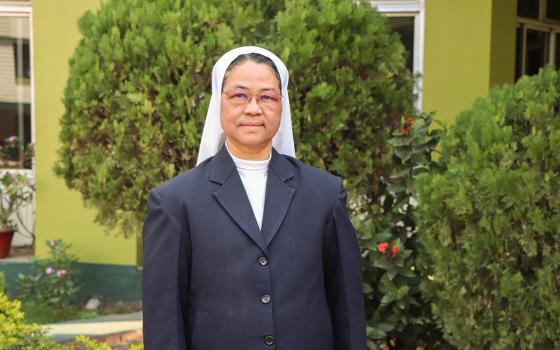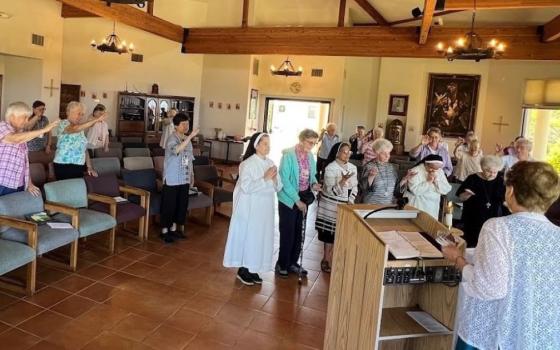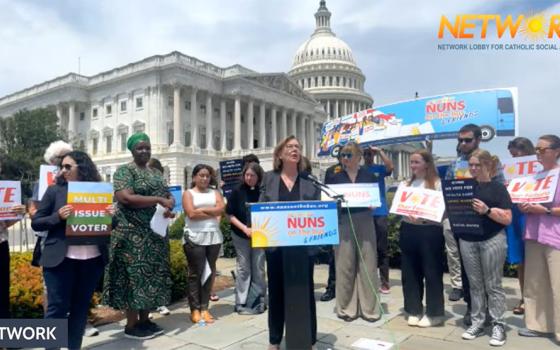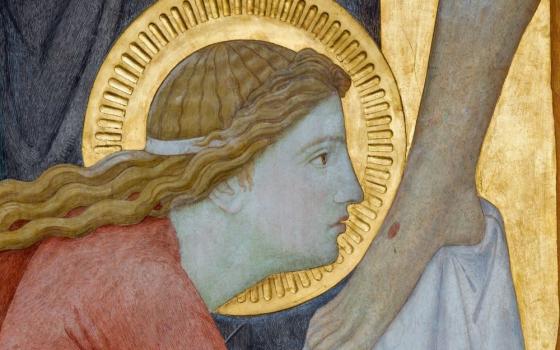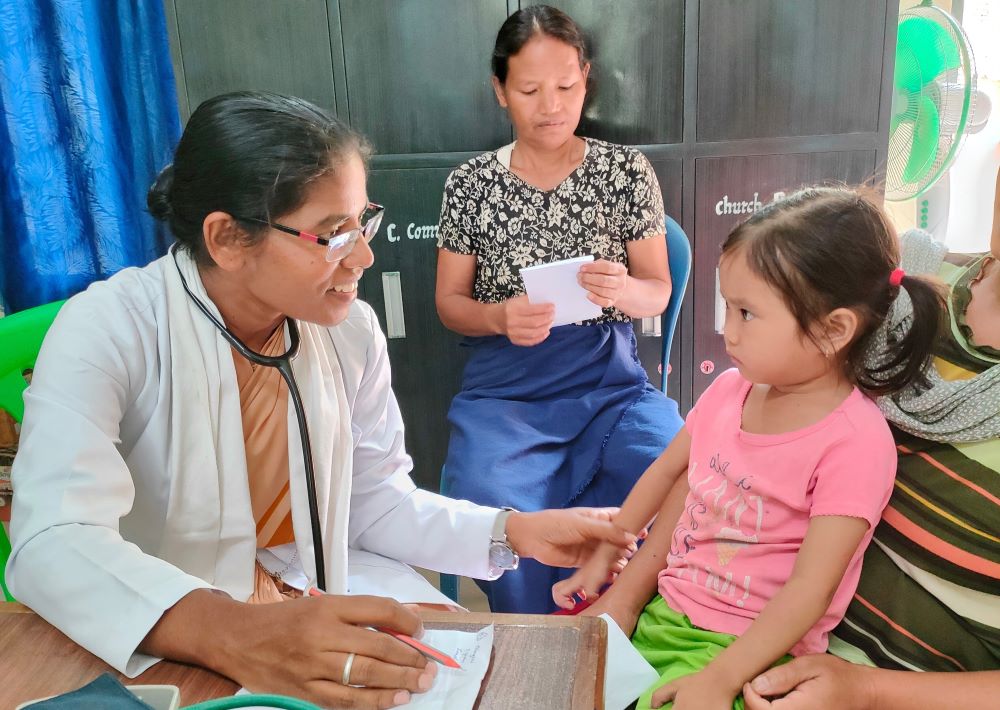
Bethany Sr. Mable Clara D'Mello, a homeopathic doctor, treats a child at a relief camp in Phainom village in Saikul, Manipur, northeastern India. (Courtesy of Mable Clara D'Mello)
Bethany Sr. Mable Clara D'Mello was among seven nuns from five congregations and three Camillus priests who spent two weeks in the relief camps of Manipur, a northeastern India state where ethnic violence has raged since May 3.
The nuns belonged to the Franciscan Clarist Congregation, Sisters of St. Joseph of Cluny, Franciscan Missionaries of Mary and Franciscan Hospitaller Sisters of the Immaculate Conception and the Bethany congregation. They are based in the southwestern Indian states of Karnataka and Kerala.
The ongoing clash is between the majority Meitei community (who are mostly Hindu) and Kukis, one of the tribes in the state (most of them Christian). A tribal solidarity rally triggered the May 3 violence, as the Meiteis attacked the rallyists when they returned from the event.
D'Mello and others found more than 60,000 people living in the camps after they lost houses, land and other possessions.
D'Mello, from Mangaluru, a town in Karnataka state, spoke to Global Sisters Report in mid-September after the team's return to their bases.
Global Sisters Report: What made you want to go to Manipur?
D'Mello: I have always been passionate to take up challenging missions. My congregation trained me as a homeopathic doctor and I was ready to serve wherever I am called. One day, when I was sitting in my clinic near our convent, I had an inner call to go to Manipur and serve those in the camps there. I also read the sharing by Camillus Fr. Siby Kaitharan, on his relief mission in Manipur. Then I had a call from my provincial asking me if I would like to go to Manipur with a Camillian medical mission. I was surprised and said yes.
We went to Imphal (capital of Manipur) Aug 21. We had to undergo two hours of security checks and various procedures at the airport before we were given visit passes for two weeks. Outside the airport, we were received by the priests from the Imphal archbishop's residence where we stayed for a night. Fr. Roy Muthedathu (of the Missionaries of Francis De Sales) coordinated our visits to the relief camps.
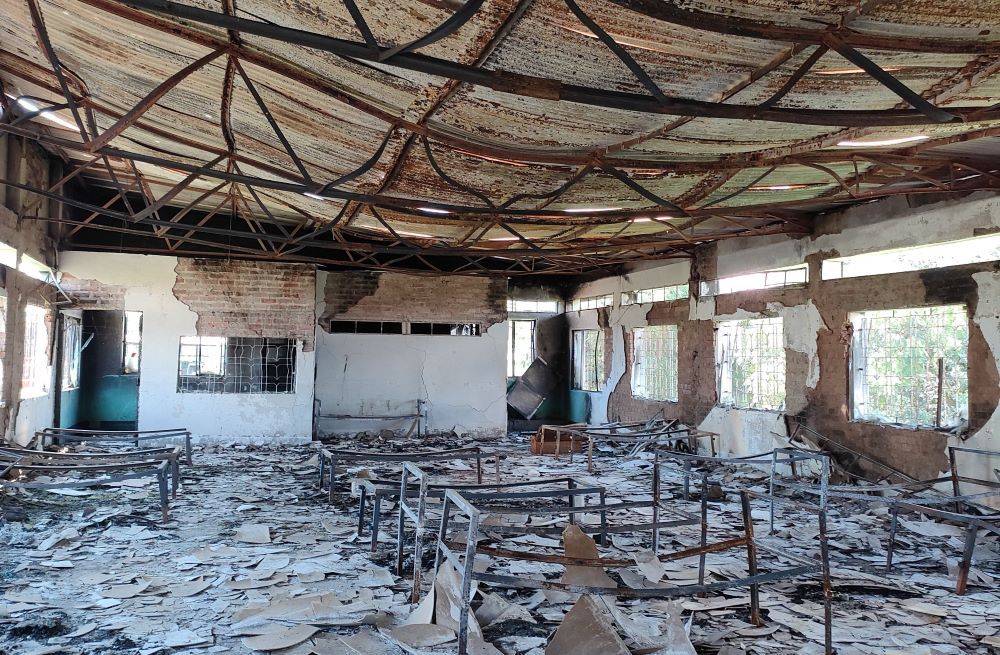
This church on the campus of the Catholic Pastoral Training Centre was torched by Meitei rioters in Imphal, capital of Manipur state in northeastern India. (Courtesy of Mable Clara D'Mello)
Were you not afraid?
I was really afraid, despite my initial enthusiasm. We had to go to a Franciscan mission in Kangpokpy that was heavily guarded by the Meitei women who led the riots in Manipur. I went to the chapel and prayed to Jesus to give me courage. When I opened the Bible, I saw Joshua 1:1-9 which read, "Do not be afraid," and "Be strong and of good courage." The verses encouraged me and kept me optimistic throughout our mission there. We were stopped by the rioters at many places. I would sit at the window of our vehicle and smile at them. They too smiled and never checked our luggage. The roads were really bad and at times we had to get down and push the vehicle.
Tell us about your experiences in the relief camps.
We were divided into two groups and we visited one camp each day. Each camp had 100 to 200 people who lived with minimum facilities — sometimes in thatched houses, schools or church buildings. Their food was just sticky rice and dal (lentil) and they ate only twice a day. They could not move out of their camps as shooting continued outside. Kuki boys guarded the camps that housed women, children and the aged. They had no idea when they would go back to their villages or homes. They lived in "some hope" that one day peace will return to their land.
I served in 10 camps. We returned to our base by midnight after attending to everyone. People slept on the floor and most had only clothes with them. Many relief workers were outsiders, volunteers from the Catholic Hospital Association of India, Caritas India, and different Christian denominations who regularly supplied relief materials and food items. The camps were overcrowded and lacked cleanliness. It was heartbreaking to see small children, babies and their mothers sleeping in the same hall with others. I found the Kukis, who are Christians, finding time to pray services daily. I think the prayers have helped them live in hope.
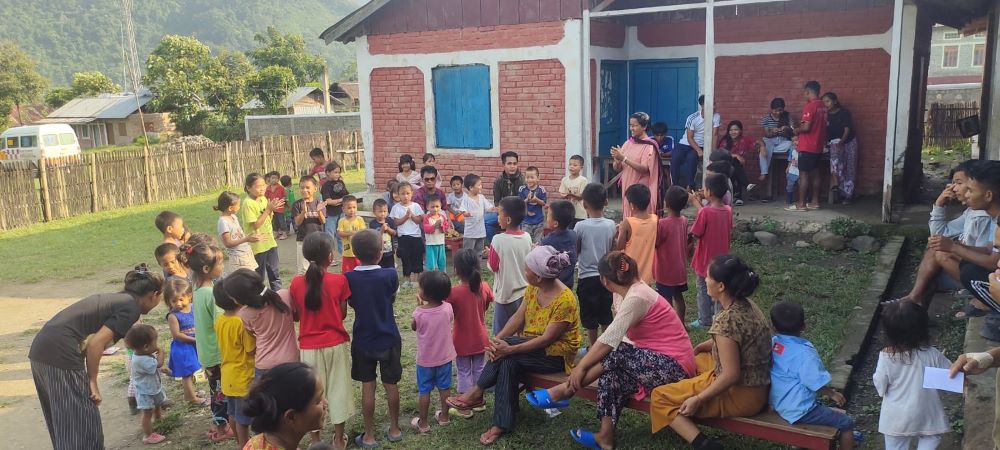
Children in a relief camp at Chalwa village in Manipur participate in an activity organized by Sr. Shobhana of the Sisters of St. Joseph of Cluny. (Courtesy of Mable Clara D'Mello)
What did you really do in the relief camps?
We organized health camps and at times, conducted psychoeducation sessions or some activities to boost their mental health and distributed medicines. We went to a village each morning and returned to our base in the Franciscan house by midnight. Most often, individual meetings with the people took long hours.
What health problems did you observe in the camps?
Generally, people were healthy. Though there were all chances of an epidemic in camps, somehow, it has not yet happened. Their immunity is very good and they are strong both mentally and physically. We treated some cases of fever and influenza, diabetics and blood pressure among the old. Some women were pregnant and several had small babies. Children were malnourished and weak. More than physical ailments, they were in need of psychological support and counseling for trauma.
A day after we returned from a village, a shooting took place near the camp there, killing three Kuki youths. Officially, more than 180 people have been killed in Manipur so far. But the real number could be more.
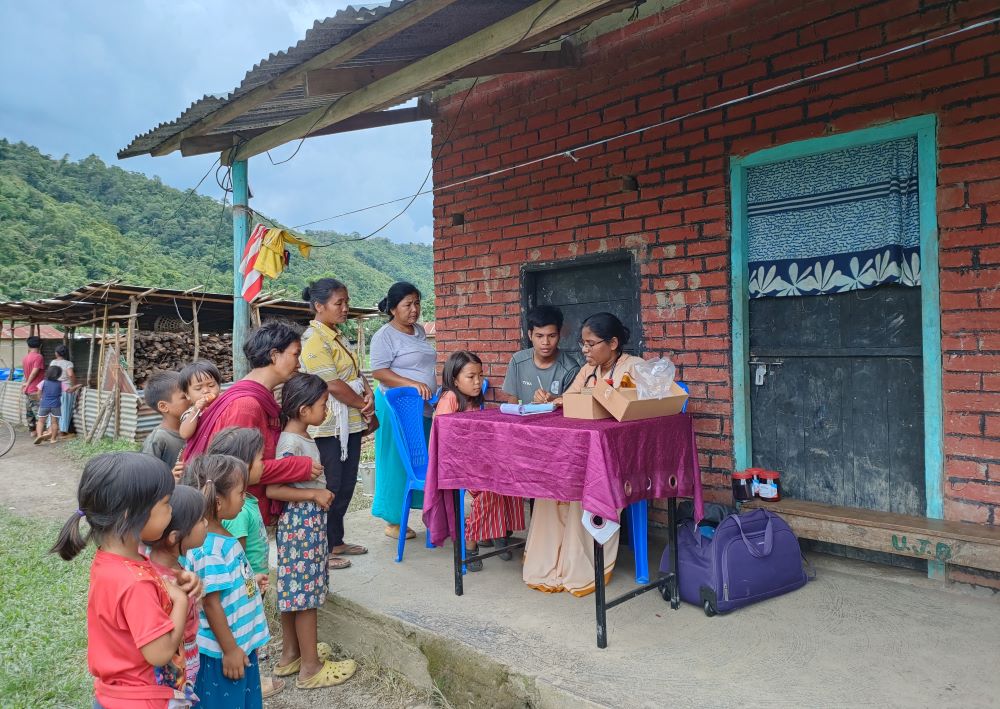
Bethany Sr. Mable Clara D'Mello attends to children in a medical camp at Denglen village in Saikul, Manipur, northeastern India (Courtesy of Mable Clara D'Mello)
Did you interact with the youth?
Young boys guard their villages and relief camps. We could not get a chance to interact with them as they were not available. But many young people from Manipur are now scattered around the country, studying in various Christian institutions. Even in Mangaluru, at least 100 study in colleges and stay in White Doves homes, a free hostel managed by a laity organization.
How is their Christian faith?
Most Christians in Manipur are Baptists. Catholics are a minority, and they always wear a rosary. But all Christians live in harmony and they pray together, despite their denominational differences. We also joined their prayers and meals in the camps. They lived as one family and their unity and mutual understanding were really motivating. I have observed that their strong faith makes them live in hope. Most interacted freely with us as if they knew us earlier. Generally, the people of Manipur respect Catholic nuns and priests, and we felt safe there.
Advertisement
As a psychotherapist, could you do something to boost their mental health?
Generally, they were stronger in mental health although we dealt with some cases of trauma and post-traumatic stress disorders, especially among women and children, who had witnessed violence. We did not come across many cases of depression or anxiety disorders. Living in camps for more than four months would have caused such issues.
What are their needs?
Justice. They need justice, not our relief materials or medicines. The Kukis have lived in Manipur for centuries but are now being projected as illegal migrants from Myanmar. The Indian church should press the government to give them justice. They have a right to live in their land with dignity, safety and freedom. If I get a chance, I would speak to the prime minister. I know I cannot do that, but I am ready. I think the church leaders in India are really scared. We are a minority in this county and what is happening to Christians in Manipur may happen to us in other parts of the country. Like Manipur's Kuki Christians, we must be prepared to face such persecutions and live in hope.
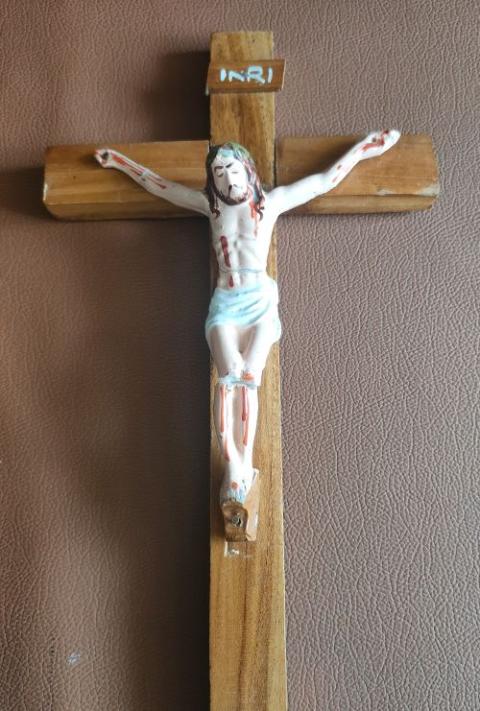
Bethany Sr. Mable Clara D'Mello retrieved this crucifix from the debris of a burnt church in the compound of the Pastoral Training Centre at Sangaiprou in Imphal. (Courtesy of Mable Clara D'Mello)
Did you visit any violence-hit villages?
Yes, I visited the parish in Canchipur where our Bethany sisters work. The church was torched. Our convent survived, but everything in it was looted. I also visited the torched church in the Pastoral Training Centre in Sangaiprou in Imphal valley, where I found in the debris a crucifix with Jesus' legs and hands broken. I got it repaired and installed it in our chapel in Mangaluru. I think it was a miracle that the crucifix survived the fire. It strengthened my faith.
Tell us something about your vocation and why you chose to be a Bethany nun?
I had the desire to become a nun from my childhood onwards. My main inspiration was my elder sister, a nun, who was my role model with her commitment and dedication. But my parents prepared me with their life witness to serve humanity. They were always kind to the poor and engaged in social work and evangelization in their own way. After my matriculation, I joined a Bethany Sisters' hostel for college studies where I felt attracted to the nuns' simple lifestyle and dedication. Being a congregation of Mangalore origin, I could easily integrate into the religious life.

